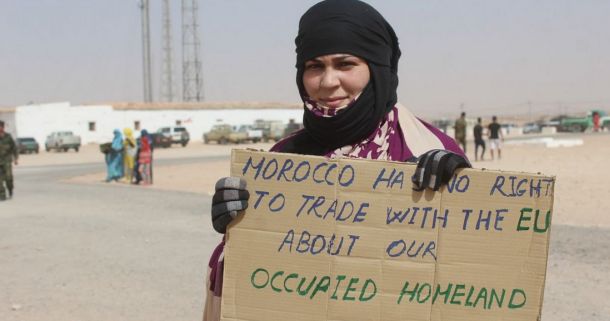
The EU Commission has today presented its suggested trade arrangement for occupied Western Sahara, which still requires the approval of the EU Member States and the EU Parliament.
Update, 02.07.2018: Read WSRW's brief about the Commission's proposal.
The EU Commission’s proposal comes as a result of the December 2016 ruling of the Court of Justice of the European Union (CJEU), stipulating that no EU trade or association agreement with Morocco could be applied to Western Sahara, unless with the consent of the people of the territory.
Concretely, the Commission and Morocco have agreed to amend Protocol No 1 (access to the EU market for agricultural and fisheries products) and No 4 (dealing with rules of origin) of their bilateral Association Agreement. The aim is to maintain the trade flow from Western Sahara within the framework of this agreement with Morocco. The draft Agreement proposes that "products originating from Western Sahara which are subject to the control of the Moroccan custom authorities benefit from the same commercial preferences granted by the EU to products covered by the association agreement". As such, no new preferences are introduced; the only purpose of the amendment is to extend the scope of the Agreement to include the parts of Western Sahara that are under Moroccan occupation.
The EU Commission on 11 June released three documents. The first two are the draft Council decisions, with respect to the sought signature and conclusion of the proposed amendment to Protocols No 1 and 4 of the EU-Morocco Association Agreement. Find the draft Council decision regarding signature here and the one relating to the deal’s conclusion here. Essentially, these are similar documents, but they will be signed by the Member States at a different moment in the legislative procedure: Council can already adopt the decision on signature now, since the negotiations have been finalized, but the decision to conclude can only be taken once the European Parliament has given its consent and the EU Member States have ratified the proposal.
The proposed amendment will now be sent to the governments of the EU Member States and to the European Parliament for approval. The Commission has also included a report on the supposed benefits to the "local population" and the economy of the territory - something the CJEU found irrelevant: what matters, in order to have an agreement lawfully affect a third party, is that that such third party has granted its consent (§106, C 104/16 P).
The people of Western Sahara have not consented to the deal. To the contrary, the UN-recognised representation of the Western Sahara people, the Polisario, and a wide spectrum of Western Sahara civil society organisations, have rejected the EU's approach of striking a deal affecting their land with the occupying power, Morocco.
Instead of even seeking the consent of the people of Western Sahara, the EU Commission resorted to a consultation process after already having initialed the proposed deal with Morocco. And the list of consulted stakeholders, as included as an annex to the benefits-report, consists of Moroccan political bodies, state companies and Moroccan organisations that all defend Morocco’s occupation of Western Sahara. Find that list here, as well as an analysis of the questionable aspects of the consultation-approach.
Morocco allocates land in occupied Western Sahara to green hydrogen investors
Morocco’s ambitions to become a global green hydrogen powerhouse are accelerating. Yet, Rabat is allocating land in a territory it does not legally own.
US eyes minerals in occupied Western Sahara
Seeking to position itself as a key supplier of strategic minerals for Western powers, Morocco has signed a new agreement with the United States that covers Western Sahara’s waters and the critical minerals harboured there.
TAQA-Moeve obtains land in occupied Western Sahara
Morocco’s push for green hydrogen has taken a decisive step forward - on territory it does not legally own.
EU-Morocco Statement: autonomy without self-determination, law without lawfulness
A joint statement that came out of last week’s EU-Morocco Association Council asks readers to believe in a fiction: that an undefined autonomy plan imposed by an occupying power can satisfy the right to self-determination, and that respect for international law can coexist with the systematic ignoring of the EU’s own highest court.



